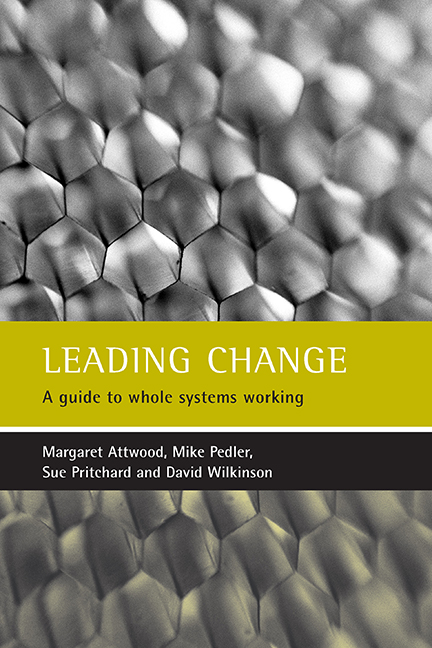Book contents
- Frontmatter
- Contents
- Foreword
- Foreword
- Prologue
- one Why do we need whole systems change?
- Two How Do We Put These Fine Words Intoaction? An Overview of Whole Systems Development
- Three The emerging practice of wholesystems development
- Four Leadership: keeping the big picture in view
- Five Public learning
- Six Valuing difference and diversity: getting the whole systeminto the room
- Seven Meeting differently: large and small group working
- Eight Follow-through and sticking with it
- Nine From organisations to networks
- Ten Confirming cases: local problems andlocal solutions within whole systems
- Epilogue
- Bibliography
- Index
Prologue
Published online by Cambridge University Press: 20 January 2022
- Frontmatter
- Contents
- Foreword
- Foreword
- Prologue
- one Why do we need whole systems change?
- Two How Do We Put These Fine Words Intoaction? An Overview of Whole Systems Development
- Three The emerging practice of wholesystems development
- Four Leadership: keeping the big picture in view
- Five Public learning
- Six Valuing difference and diversity: getting the whole systeminto the room
- Seven Meeting differently: large and small group working
- Eight Follow-through and sticking with it
- Nine From organisations to networks
- Ten Confirming cases: local problems andlocal solutions within whole systems
- Epilogue
- Bibliography
- Index
Summary
This book has been some time in the writing. It represents the dialogue, bothconceptual and practical, between the four of us, as consultants, researchers andwriters concerned with the integration of thinking and action across threelargely disconnected fields of activity – organisation development, communitydevelopment and the implementation of government policy on public services.Its context is one of a rapidly changing social and public policy landscape.
The pressures continue to grow for new forms and standards of delivery andfor local joining up and reconnecting of services to users, citizens andcommunities. This demands new service configurations, and new forms ofpartnership and local and neighbourhood governance. The organisationalchallenges to meet these changing requirements are considerable. In this bookour exploration of them can be summarised as a question: How canorganisations fit to house the human spirit be created and sustained such thatthey meet the needs of communities and society at large?
Our responses to this from our various experiences have driven us to despairas well as giving a sense of the emerging possibilities.
On the dark side we see organisations whose design is still based on machine-like and territorial assumptions where:
•change is equated with restructuring, with the attendant dangers of movingthe chairs around the deck of the Titanic and, in the process, setting backprogress to improve services;
•managerial attention is focused on internal silos to the detriment of a coherentapproach to stakeholder needs;
•territory is defended against the demands or wishes of partners and residents,and even against the ‘unreasonable’ demands of staff;
•the attention span is short and of the ‘let’s fix it’ variety, rather than taking alonger-term and sustainable view.
Such organisations are not usually populated by bad or even incompetentpeople. People, we believe, are the product of the circumstances, the system, inwhich they find themselves. Firing the key people will not change these designassumptions; equally, developing individual competencies alone will not changethe way things work.
On the brighter side some people and organisations are:
•working creatively with local residents to improve services;
•asking different questions about ways of organising that support-improveddelivery;
•seeing structural change as only one ingredient of sustainable development;
- Type
- Chapter
- Information
- Leading ChangeA Guide to Whole Systems Working, pp. xiii - xviPublisher: Bristol University PressPrint publication year: 2003



